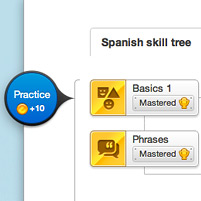Translating the Web


Screenshot of Duolingo website
Users of a new, free website, Duolingo, will help tackle the gargantuan task of translating the web even as they learn a new language.
The site, created by Carnegie Mellon University computer scientists Luis von Ahn and Severin Hacker, features computer tools that enable these foreign language novices to translate text — as well as a professional.
Duolingo has received funding from Union Square Ventures, a venture capital firm with technology investments that include Twitter, Tumblr, Foursquare and Zynga, and from actor-producer Ashton Kutcher.
The site has been used by more than 100,000 people in a just-completed beta test, offers free language lessons in English, Spanish, French and German.
In addition to computer-generated exercises to build vocabulary and grammar skills, Duolingo offers users a chance to practice their new language skills on real-world texts from the web, with the computer providing advice and guidance on unknown words.
"When you're doing the real-world stuff, such as reading a news report in German or French, you really feel like you're accomplishing something," said von Ahn, an associate professor of computer science at CMU. "It reinforces why you're working to understand this new language."
But these exercises do more than motivate the language student. They also generate translated text.
Von Ahn and Hacker, a Ph.D. student in computer science at CMU who has worked on the project from its inception, have found these translations match the quality of professional translators and are far better than most automated translation services.
If Duolingo can attract enough of the one billion people worldwide who are at any given time trying to learn a new language, these exercises could go a long way toward translating the web.
Von Ahn has used such crowdsourcing approaches successfully in the past to tackle big problems. Notably, in 2007 he created the online puzzles known as reCAPTCHAs, which serve to reduce spam and protect websites from automated, malicious programs.
Duolingo was spun off from CMU in November 2011 and the startup now employs 13 people in Pittsburgh. Eventually, the company plans to provide commercial translation services, though its primary purpose will remain translating web resources for free.
It's this kind of entrepreneurship that is embedded within the culture of the university and supported by CMU's Greenlighting Startups.
Building upon the university's already impressive record of turning campus innovations into sustainable new businesses, Greenlighting Startups accelerates CMU's position as an engine for commercializing innovation and job creation.
![]() Greenlighting Startups is uniquely designed to support CMU's culture of entrepreneurship and new business creation. Learn more »
Greenlighting Startups is uniquely designed to support CMU's culture of entrepreneurship and new business creation. Learn more »
Related Links: Read NY Times article | Read the press release | School of Computer Science | Greenlighting Startups
